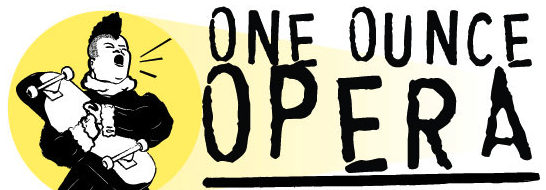
This is the third in our series of composer spotlights previewing the Inaugural Fresh Squeezed Ounce of Opera, April 15, 16, 2016.
Meet Austinite Jeff Luna, whose winning short comic operetta Love After the Collapse of Civilization will have you swiping right, and wondering about where we might really be headed.
OOO member Angela Irving conducted this interview.
Be the TITLE SPONSOR for Love After the Collapse of Civilization!
1) What inspired you to write Love After the Collapse of Civilization?

I was inspired to write Love After the Collapse of Civilization after dating on sites like Tinder and OkCupid and seeing how strange the reality of dating has become, and how that reality has become the new normal. And in the future, when our grandkids are telling us about how complicated dating has become what with all the telekinesis and mind-melding, we’ll be telling them how simple it used to be, when we would just push a button on someone’s picture to tell them we liked them. Also, post-apocalyptic stories are fun to write, so I decided to make an operetta about a nostalgia for 2016-era dating in a primitive society after the world more or less ended.
2) I love how you chose to break the 4th wall in LACC! Why/how did that device strike you for this piece?
In any story that happens after the end of the world, there’s a ton of backstory that needs to somehow be revealed. The only way I could imagine having this backstory be revealed was through the main characters to an outsider. In this future there’s only about 200 people, and they all know very well just what happened, so the outsider would have to either be an extraterrestrial, a time-traveler, or a last-minute emergency interpretive narrator. I chose the latter, which necessitated breaking the 4th wall.
3) Looking at your website, it looks like you’re heavily involved with a bunch of different genres of music, from classical to rock to commercial music — was this your plan?
As a professional composer without a music degree, I take whatever jobs I can get and try to give my clients whatever they want, even if it’s in a style I’m not familiar with. This involves a lot of musical cramming and approximation of various genres, but it’s worked so far, and as a result I have lots of tiny genre fragments in my head that come in handy when I’m writing.
4) You’ve written a lot of scores for films, and even won some awards for them! — Will you talk about your process for writing music for other people’s existing art works and your process for creating your own?
With film scores, the director has often already made up their mind about the exact feel of the music they want in each scene. The challenge is to translate adjectives like “dark,” “ominous,” “cheery,” or “hopeful,” into musical passages that meet the director’s expectations. I’m not a very good mind reader, so usually it’s a matter of trial and error, and can be frustrating, but the end result is that I end up writing more music than I would have otherwise, which is awesome. The process for creating my own pieces is the same as the process for writing for others, but trying to figure out what it is that I want and what I’ll ultimately be happy with can be more difficult than working with a picky director.
5) As a member of Minor Mishap Marching Band, a group that brings brass band music to the streets of Austin, TX, and a member of/composer for the late Sound Bridge Project, a group that sought to bridge the gap between classical music and the general public, where do you feel the future of classical music and the general public (especially of Austin) is going?

A 25 piece costumed brass band playing upbeat catchy music will always have an audience. Minor Mishap can be subtle too, and we do it well, but we have to gauge the audience first, because a lot of times they’re expecting loud and audacious. The Sound Bridge Project was very successful at bringing classical music to a public that might not experience it otherwise, in listening rooms such as Flipnotics or the Vortex Theater. However, in other venues we would encounter the same problems musicians in every genre experience in Austin, where the music is relegated to the background and you’re performing amongst chatter, large televisions, and other audience distractions. Loud amplified music can cut through the chatter and it doesn’t affect the performance much, but a delicate classical piece is quickly drowned in that atmosphere. The success of a classical music performance is hinged on people paying attention – there’s a lot of interesting things happening in the harmonies, counterpoint, and rhythm that you’re going to miss if you’re in the middle of a conversation. I think it should absolutely be performed in unconventional spaces, but only if the audience understands that they’ll enjoy it a lot more if they pay attention. We need Alamo Drafthouse style warnings before performances – DON’T TALK OR TEXT OR WE’LL KICK YOUR ASS OUT.
Jeff Luna is a composer, arranger, engineer, producer, music director, and musician. Mr. Luna has composed and arranged original scores to documentaries, feature films, plays and musicals, documentaries, a short opera, and has also written songs and music for international PR firms and advertising agencies. In addition, he has over 14 years experience recording and producing music of many different genres.

